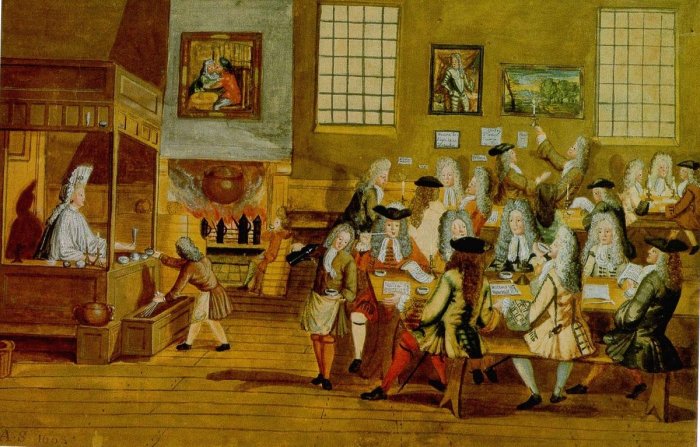Chocolate Was A ‘Hot Property’ In 17th Century England And There Were Rules For Safe Consumption
Ellen Lloyd - AncientPages.com - In 1675, King Charles II of England issued a proclamation to end the legality of coffeehouses. He banned coffeehouses and forbade people from selling coffee, chocolate, sherbet, and tea from any shop or house. The ban was later lifted, but the history of chocolate consumption in England has been interesting, to say the least.
Chocolate was 'hot property' in the 17th century - and subject to rules for safe consumption, according to Dr. Kate Loveman, a lecturer at the University of Leicester, who has uncovered the first - nearly 350 years old - English recipes for iced chocolate desserts.
In the 17th century, however, these chilly treats were believed to be as dangerous as they were delightful.
Chocolate House London. Credit: Public Domain
The Earl's own recipe reads: "Prepare the chocolatti [to make a drink]… and Then Putt the vessell that hath the Chocolatti in it, into a Jaraffa [i.e. a carafe] of snow stirred together with some salt, & shaike the snow together sometyme & it will putt the Chocolatti into tender Curdled Ice & soe eate it with spoons."
"It's not chocolate ice-cream, but more like a very solid and very dark version of the iced chocolate drinks you get in coffee shops today. Freezing food required cutting-edge technology in seventeenth-century England, so these ices were seen as great luxuries," Dr. Loveman said.
"Chocolate was first advertised in England around 1640 as an exotic drink made from cacao beans. In the 1660s, when the Earl of Sandwich collected his recipes, chocolate often came with advice about safe consumption."
"One physician cautioned that the ingredients in hot chocolate could cause insomnia, excess mucus, or haemorrhoids. People worried that iced chocolate in particular was 'unwholesome' and could damage the stomach, heart, and lungs."
Interior of a London Coffee-house, 17th century. Credit: Public Domain
"There were ways round this, however. Sandwich thought the best way to ward off the dangers of eating frozen chocolate was to 'Drinke Hott chocolatti ¼ of an houre after' it. In other words, chocoholics are not new.
"I tried out the freezing method using snow - and lived to tell the tale, despite not following Sandwich's advice."
Dr. Loveman found a range of chocolate recipes in the Earl of Sandwich's journal, written after he became enamored of the drink while ambassador extraordinary to Spain in the 1660s.
The manuscript includes King Charles II's prized recipe for spiced and perfumed chocolate - which Sandwich reported cost the King £200.
From the 1640s, chocolate was sold as an exotic drink that could cure illnesses and act as an aphrodisiac.
The truth often played second fiddle to promotion: one purveyor, Captain James Wadsworth, claimed as early as 1652 that chocolate was "thirsted after by people of all Degrees (especially those of the Female sex) either for the Pleasure therein Naturally Residing, to Cure, and divert Diseases; Or else to supply some Defects of Nature".
As chocolate sellers sprung up across London in the 1650s, a milky version of the drink began to be sold in coffee houses.
Credit: Adobe Stock - Nitr
"The novice chocolate drinker of the 1650s and 1660s ran greater risks than money ill spent: he had to bear in mind that the new product might damage his health and there was the real possibility of loss of face through having his inexperience exposed," Dr. Loveman said.
By the 1690s elite 'chocolate houses' were selling the drink to an aristocratic and leisured clientele. Chocolate was widely mentioned in the literature and had already acquired some of the associations with indulgence and pleasure it has today.
"Today's chocolate promoters, like some in the seventeenth century, often find cause to highlight women, pleasure, and sexuality.
"In the seventeenth century, however, the fact that frequent chocolate consumption might make you 'Fat and Corpulent' was an attraction, something advertisers now prefer to keep quiet about."
Written by - Ellen Lloyd – AncientPages.com
Updated on October 11, 2023
Copyright © AncientPages.com All rights reserved. This material may not be published, broadcast, rewritten or redistributed in whole or part without the express written permission of AncientPages.com
More From Ancient Pages
-
 Time Capsule: Sunken Ancient City Of Baiae
Archaeology | Mar 27, 2014
Time Capsule: Sunken Ancient City Of Baiae
Archaeology | Mar 27, 2014 -
 Pandavleni Caves: Skillfully Carved Rocky Realms Decorated With Sculptures And Inscriptions In Brahmi Script
Featured Stories | Aug 1, 2016
Pandavleni Caves: Skillfully Carved Rocky Realms Decorated With Sculptures And Inscriptions In Brahmi Script
Featured Stories | Aug 1, 2016 -
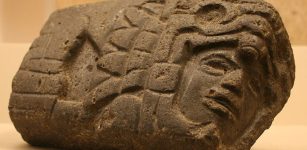 Sociopolitical Organization In Mesoamerica Influenced Developed Writing Systems And Communication
Archaeology | Feb 16, 2022
Sociopolitical Organization In Mesoamerica Influenced Developed Writing Systems And Communication
Archaeology | Feb 16, 2022 -
 DNA Study Of Ice Age Survivors Reveals A Surprise About The Gravettian Culture
Archaeology | Mar 1, 2023
DNA Study Of Ice Age Survivors Reveals A Surprise About The Gravettian Culture
Archaeology | Mar 1, 2023 -
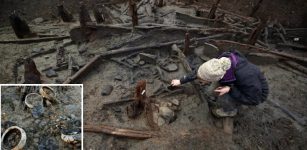 Mystery Of The British Pompeii Deepens – Bronze Age Settlement Destroyed By Dramatic Fire
Archaeology | Jun 23, 2019
Mystery Of The British Pompeii Deepens – Bronze Age Settlement Destroyed By Dramatic Fire
Archaeology | Jun 23, 2019 -
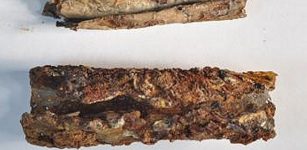 CT Scanning And 3D-Modelling Used To ‘Unfold’ Ancient Silver Plate Found In Jerash
Archaeology | Dec 26, 2015
CT Scanning And 3D-Modelling Used To ‘Unfold’ Ancient Silver Plate Found In Jerash
Archaeology | Dec 26, 2015 -
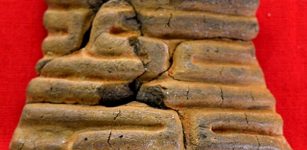 3,000-Year-Old Piece Of Pottery Unearthed On Okinawa Island, Japan
Archaeology | Feb 21, 2017
3,000-Year-Old Piece Of Pottery Unearthed On Okinawa Island, Japan
Archaeology | Feb 21, 2017 -
 Legendary Beowulf Fighting Dragon Grendel In Heroic Poem Written In Anglo-Saxon England
Featured Stories | Aug 14, 2022
Legendary Beowulf Fighting Dragon Grendel In Heroic Poem Written In Anglo-Saxon England
Featured Stories | Aug 14, 2022 -
 Why Did Ancient Egyptian Scribes Face Serious Health Risks?
Archaeology | Jun 27, 2024
Why Did Ancient Egyptian Scribes Face Serious Health Risks?
Archaeology | Jun 27, 2024 -
 Large 1,500-Year-Old Winepress Unearthed In Area Once Known For Wine production.
Archaeology | Oct 29, 2015
Large 1,500-Year-Old Winepress Unearthed In Area Once Known For Wine production.
Archaeology | Oct 29, 2015 -
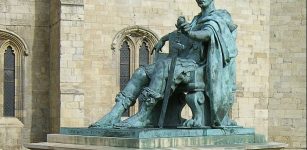 On This Day In History: Edict Of Milan Is Signed – Persecution Of Christians Ends – June 13, 313 AD
News | Jun 13, 2016
On This Day In History: Edict Of Milan Is Signed – Persecution Of Christians Ends – June 13, 313 AD
News | Jun 13, 2016 -
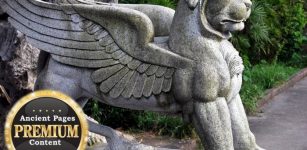 Strange Ancient Mechanical Flying Animals – Myths Or Advanced Ancient Technology? – Part 1
Ancient Mysteries | Mar 25, 2020
Strange Ancient Mechanical Flying Animals – Myths Or Advanced Ancient Technology? – Part 1
Ancient Mysteries | Mar 25, 2020 -
 Clues What Tiggered Climate Change 8,000 Years Ago Found In Scotland
News | Sep 15, 2023
Clues What Tiggered Climate Change 8,000 Years Ago Found In Scotland
News | Sep 15, 2023 -
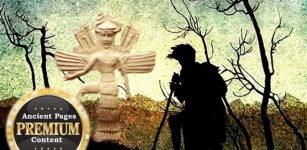 Ancient Flying Canoes And Magic In The Pacific – Arrival Of Strange People – Part 1
Ancient Mysteries | Jan 28, 2020
Ancient Flying Canoes And Magic In The Pacific – Arrival Of Strange People – Part 1
Ancient Mysteries | Jan 28, 2020 -
 Advanced Technology Of The Ancients: Artificial Platforms Of Mighty Nan Madol
Civilizations | Sep 14, 2018
Advanced Technology Of The Ancients: Artificial Platforms Of Mighty Nan Madol
Civilizations | Sep 14, 2018 -
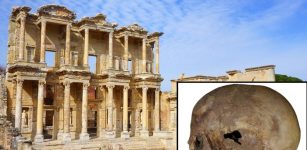 Mystery Of The Ancient Skull Found In Ephesus Solved – It Did Not Belong To Arsinoë IV, Cleopatra’s Sister
Archaeology | Jan 10, 2025
Mystery Of The Ancient Skull Found In Ephesus Solved – It Did Not Belong To Arsinoë IV, Cleopatra’s Sister
Archaeology | Jan 10, 2025 -
 Scientists In Antarctica Encounter Something Very Strange
Featured Stories | Mar 9, 2020
Scientists In Antarctica Encounter Something Very Strange
Featured Stories | Mar 9, 2020 -
 Magnificent Ancient Treasures Of The Mysterious Kangju Kingdom Found By Archaeologists
Archaeology | Jun 11, 2024
Magnificent Ancient Treasures Of The Mysterious Kangju Kingdom Found By Archaeologists
Archaeology | Jun 11, 2024 -
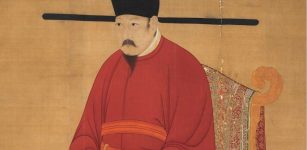 On This Day In History: Most Unusual Emperor Renzong Of Song Dynasty Was Born – On May 30, 1010
News | May 30, 2016
On This Day In History: Most Unusual Emperor Renzong Of Song Dynasty Was Born – On May 30, 1010
News | May 30, 2016 -
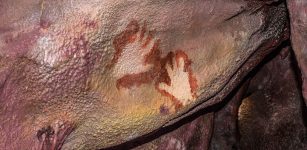 Neanderthals: The Oldest Art In The World Wasn’t Made By Humans
Featured Stories | Jan 17, 2023
Neanderthals: The Oldest Art In The World Wasn’t Made By Humans
Featured Stories | Jan 17, 2023


